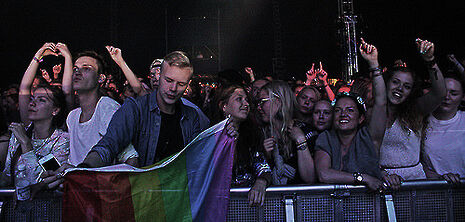A queerer perspective: A new, queer pop?
Louis Shankar contemplates the rise of out and loud LGBTQ+ artists in the music industry

The past few years have seen a really wonderful change in the music industry, with more and more out and, significantly, vocal LGBTQ+ artists finding popular and commercial success around the world.
Anohni, formerly known as Antony, the lead singer of Mercury Prize-winning Antony and the Johnsons, has identified as transgender since childhood, but has only relatively recently started adopting female pronouns. This year, she became only the second transgender person to be nominated for an Oscar, for her song Manta Ray from Racing Extinction. In the end, the award went to Sam Smith, who dedicated it to the LGBTQ+ community, referring to a recent interview with Sir Ian McKellen, who lamented the lack of openly gay men winning Academy awards.
Smith came out as gay in 2014 before the release of his debut album. “I kind of just felt like I needed to mention it before I released the record so people knew what it was about”, he said, explaining that In The Lonely Hour was about “a guy that I fell in love with last year, and he didn't love me back.” The album went on to be a commercial success worldwide, topping the charts in six countries. Smith himself went on to win four Grammy Awards.
More recently, we have seen the rise of both Olly Alexander (frontman of Years & Years) and Troye Sivan. I’ve paid quite close attention to both, not merely they are something of personal celebrity crushes, but because they use pop as a platform for wider concerns. Both have been vocal about gay rights and LGBT+ issues, making headlines in both gay press and mainstream media with comments about identity issues.
Alexander has become an important voice for such topics, opening up about body-image issues – still unusual amongst male celebrities – and his own mental health. Moreover, Sivan helped a fan come out as bisexual at one of his concerts; a former child star, he himself came out publicly to his huge YouTube following in 2013, exactly three years after coming out to his family. Alexander, meanwhile, has sported a rainbow flag onstage (whilst donning various eccentric, couture outfits) and helped a gay couple get engaged at Years & Years’ recent show in Seattle.
Although not always explicit in their songs, both singers write songs about men, such as Sivan’s for him., thereby advocating the use of same-sex pronouns in music. Of course, a lot of songs tend to be written in the second person, addressed to the eternally neutral ‘you’: “I was a king under your control”; “Only fools fall for you.” I don’t want this to descend into a poststructuralist debate over the mortality of the author; nonetheless, it’s hard to describe the comfort, as a man attracted to men, in hearing a male voice singing to a male subject. These rare instances of non-heteronormative expression can be incredibly empowering and remarkably touching.
Knowing the context or the backstories to many of their songs tends to help. I recently saw Sivan in concert, where before performing Heaven, he explained the premise of the song: looking back to when he was fourteen, knowing that he “wasn’t straight” (cue a cheer from the crowd), not knowing how to process this. Sivan is Jewish and struggled to reconcile this with his homosexuality. In light of all this, the somewhat clichéd lyrics come to life: “Without losing a piece of me/ How do I get to heaven?… So if I'm losing a piece of me/ Maybe I don't want heaven?”
I realise this analysis isn’t terribly revolutionary, with a focus on white, male artists; however, the implications of these individuals’ means of expression are interesting and pertinent on a much wider scale. A different masculinity is emerging: a more vulnerable one. Far from the latent misogyny that pervades so much of modern music, we now see in the steadfast, assertive, domineering man, an honesty and fragility.
In a recent interview with NME, Alexander picked up on this. “Another artist who’s really capitalised on that of late is Justin Bieber”, he explained, “Think about how rare it is to have a song like Sorry being sung by one of our biggest male pop stars. It’s really unheard of and I think people clearly love that.” The main songwriter on Sorry, Justin Tranter, has called himself “The Music Industry Gay Boy”. He has penned several major hits in recent months, bringing his emphatically queer voice into the mainstream. "We wanted to make a song where the biggest male star in the world could be vulnerable, apologise and admit fault", he explained of Sorry. Several weeks ago, he posted a photo to Instagram showing three songs he had helped write in the top ten pop radio airplay chart. They were accompanied by the caption: “And hey queer kids, keep fighting, singing, and shouting. Our dreams can come true too.”
 News / Copycat don caught again19 April 2024
News / Copycat don caught again19 April 2024 Theatre / The closest Cambridge comes to a Drama degree 19 April 2024
Theatre / The closest Cambridge comes to a Drama degree 19 April 2024 Interviews / ‘People just walk away’: the sense of exclusion felt by foundation year students19 April 2024
Interviews / ‘People just walk away’: the sense of exclusion felt by foundation year students19 April 2024 News / AMES Faculty accused of ‘toxicity’ as dropout and transfer rates remain high 19 April 2024
News / AMES Faculty accused of ‘toxicity’ as dropout and transfer rates remain high 19 April 2024 News / Acting vice-chancellor paid £234,000 for nine month stint19 April 2024
News / Acting vice-chancellor paid £234,000 for nine month stint19 April 2024




